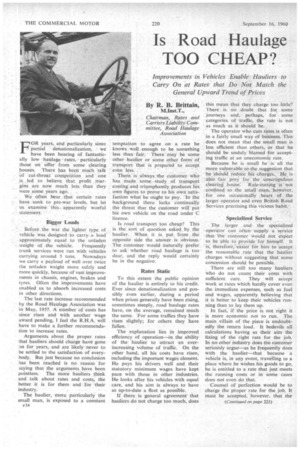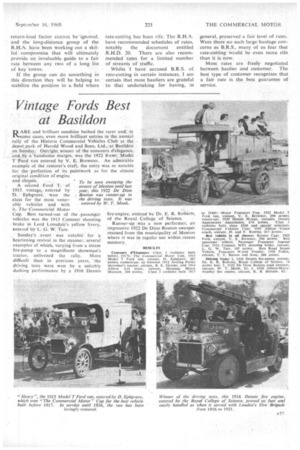Is Road Haulage TOO CHEAP?
Page 124

Page 127

If you've noticed an error in this article please click here to report it so we can fix it.
Improvements in Vehicles Enable Hauliers to Carry On at Rates' that Do Not Match the General Upward Trend of Prices By R. B. Brittain,
FOR years, and particularly since
' partial denationalization, ' we have been hearing of fantastically low haulage rates, particularly those on offer from some clearing houses., There has been much talk of cut-throat competition and one is led to believe that, profit margins are now much less than they were some years ago. We often hear -that certain rates have sunk to pre-war levels, but let us . examine this.. apparently woeful statement.
Bigger Loads
Before the war the lighter type of vehicle was designed to carry a load approximately equal to the unladen weight .the vehicle. Frequently trunk services were run with vehicles carrying around 5 tons. Nowadays we carry a payload of well over twice the unladen weight more safely and more quickly, because of vast improvements in chassis, engines, brakes and tyres. Often the improvements have enabled us to absorb increased costs in other directions.
The last rate increase recommended by the Road Haulage Association was in May, 1957. A number of costs has since' risen and• with another wage award pending, I feel the R.H.A. will have to make a further recommendation to increase rates.
Arguments about the proper rates that hauliers should charge have gone on for years, and are likely never to be settled to the satisfaction of everybody. But just because no conclusion has been reached is no. reason for iaying that the arguments have been pointless: The more hauliers _think and talk about rates and costs, the better it is for them and for their industry.
The haulier, more particularly the small man, is exposed to a constant F34 temptation to agree on a rate he knows well enough to be something less than fair. There may be some other haulier or some other form of transport that• is prepared to accept even less. •
There. is always -the customer who has made some study_ of transport costing and triumphantly produces his own figures to prove to his oWn satisfaction what he ought to pay. In the background there• lurks continually the threat that the customer will put his own vehicle on the road under C licence.
• Is road transport too cheap? This • is the sort of question asked by the haulier. When it is put from the opposite side the answer is obvious. The customer would naturally prefer to ask whether road haulage is too. dear, and the reply would certainly be in the negative.
Rates Static
To this extent the public opinion of the haulier is entirely to his credit. Ever since denationalization and possibly even earlier, during a period when prices generally have been rising, sometimes steeply, road haulage rates have, on the average, remained much the same. For some traffics they have risen slightly; for others they have fallen.
The explanation lies in improved efficiency of operation—in the ability of the haulier to attract an everincreasing volume of traffic. On the other hand, all his costs have risen, including the important wages element. He pays his drivers well and their statutory minimum wages have kept pace with those in other industries. He looks after his vehicles with equal care, and his aim is always to have as up-to-date a fleet as possible.
If there is general agreement that hauliers do not charge too much, does this mean that they charge too little? There is no doubt that for some journeys and, perhaps, for some categories of traffic, the rate is not as much as it should be.
The operator who cuts rates is often in a fairly small way of business. This does not mean that the small man is less efficient than others, or that he should be unduly blamed for accepting traffic at an uneconomic rate.
Because he is small he is all the more vulnerable to the suggestion that he should reduce his charges. He is also fair prey for the unscrupulous clearing house: Rate cutting is not confined to the small Man, however, for one occasionally hears of the larger operator and even British Road Services practising this vicious habit
Specialized Service
The larger and the specialized operator can often supply a service that The customer would not expect • to be able to provide for himself. It is, therefore, easier for him to accept the reasonable rate that the haulier charges without suggesting that some concession should be possible. There are still too many hauliers who do not count their costs with sufficient care. They will accept work at rates which hardly cover even the immediate expenses, such as fuel and wages, apparently believing that it is better to keep their vehicleS running than to lay them up.
In fact, if the price is not right it is more economic not to run. The main villain of the piece is undoubtedly the return load. It bedevils all calculations having as their aim the fixing of the right rate for the job. In no other industry does the customer seriously argue—as he frequently does with the haulier—that because a vehicle is, in any event, travelling to a place where he wishes his goods to go, he is entitled to a rate that just meets the running costs or in some cases does not even do that.
Counsel of perfection would be to charge the proper rate for the job. It must be accepted, however, that the (Continued on page 221) return-load factor cannot be ignored, and the long-distance group of the R.H.A. have been working out a skilful compromise that will ultimately provide an invaluable guide to a fair rate between any two of a long list of key towns.
If the group can do something in this direction they will be helping to stabilize the position in a field where rate-cutting has been rife. The R.H.A. have recommended schedules of rates. notably the document entitled R.HD. 20. There are also recommended rates for a limited number of streams of traffic.
Whilst I have accused B.R.S. of rate-tutting• in certain instances, I am certain that most hauliers are grateful to that undertaking for having, in general, preserved a fair level of rates. Were there no such large haulage concerns as B.R.S., many of us fear that rate-cutting would be even more rife than it is now.
Most rates are freely negotiated between haulier and customer. The best type of customer recognizes that a fair rate is the best guarantee of service.




































































































































































































































